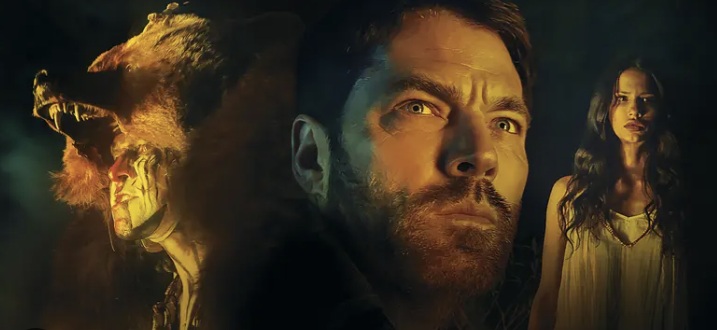![]() Yesterday at WonderCon there was a flurry of different movie panels going on back to back, but one of the most intriguing films that was showcased at the convention was Fox Searchlight’s “Sound of my Voice.” Director Zal Batmanglij, yes that’s a real last name, and lead actress / co-writer Brit Marlingmade an appearance at the panel yesterday, but not before they showed off the first twelve minutes of the film which left the audience mesmerized by the time it was over.
Yesterday at WonderCon there was a flurry of different movie panels going on back to back, but one of the most intriguing films that was showcased at the convention was Fox Searchlight’s “Sound of my Voice.” Director Zal Batmanglij, yes that’s a real last name, and lead actress / co-writer Brit Marlingmade an appearance at the panel yesterday, but not before they showed off the first twelve minutes of the film which left the audience mesmerized by the time it was over.
After that presentation we were greeted by Klaus (Richard Wharton) and Mel (Christine Meyers), a eerily composed couple who softly talked about the wonderful things that their cult group has to offer. There were chuckles in the audience from some who figured that they were two actors in character but it was a lot more entertaining sitting near those who thought they were brainwashed cult members. After the couple disappeared from the stage, we were treated to a sharp new trailer that gave out a little more information on the plot than you’d like, not leaving too much to the imagination like most of their viral marketing has been.
For those of you who may not know, the story revolves around a couple (played by Christopher Denham and Nicole Vicius) who take part in some investigative journalism by joining a cult in which the hidden leader, Maggie (played by Brit Marling), claims to be from the future. The two quickly realize that they’ve gone in way over their heads as they become even more involved with the group than they ever thought they’d be.
Now the independent feature has already been making its rounds in the film festival circuit and is gearing up for it’s theatrical release next month. After the panel was said and done, we were able to get the chance to talk with the duo about the challenges and joys of creating the movie.
What’s the process like when you work together as writers?
Brit Marling: You know, we have so much fun. We come to it everyday with a set of hours. This is our chunk of time we have together and we just play. Sometimes we act things out, like we’ve come up with scenes — we’ve played between us every character in “Sound of my Voice.” Sometimes I’m Klaus and he’s Joanne and he’s Peter and I’m Lorna and we have the fights.
Zal Batmanglij: Sometime she’s Peter and I’m Lorna. [laughs] For example there’s the driving scene. We’ve sat in two chairs. We’ve put our chairs together, we’ve sat and I’ve said “What if she is?”
Brit Marling: “Nobody’s from the future!” Yeah, and that has been really helpful, the willingness to play.
Are you recording this the whole time?
Zal Batmanglij: No, we sometimes do.
Brit Marling: We write it down if it’s a bit of a particularly good one.
Zal Batmanglij: Brit writes a lot. I think that if it sticks, it sticks. You just know it. And the stuff that doesn’t stick sort of like goes away. The stuff that propels you forward, you can see it in your partner’s eyes. You’ll be telling a part of the story like ‘Oh well Maggie wakes up in a bathtub that’s in a crack den.’ And either the person will light up or go ‘Hmm… try again’ and so I think that works for us. Then we crack the story and then the actual writing part of it happens pretty quickly once we know the story really well.
Brit Marling: But the outlining part takes a really long time. Once you play with these scenes, you’re outlining it and telling it again and again. You’re telling it to people you know and trying to make sure that the mathematics of the story work. Once you feel those are in place then the actual writing and the final draft doesn’t take as long.
Zal Batmanglij: Yeah,cause it’s very important for us. We’re viewers first and foremost. We view more than we make. So for us, it’s important that the viewing experience is fun and thrilling and exciting and fresh and different. Those are our goals when we are writing something, how, when you watch it in a theater which I hope you will soon, how will you have the best experience possible? So that’s really important to us.
So how did you decide to bring those guys out in character? Why did you decide to do that?
Zal Batmanglij: We just feel like they’re so good. Didn’t you guys think that they were good? We’re just into how seriously they can take it. You know, for us this movie was made with a lot of love. Everyone worked from the goodness of their own heart. There really was no money in this movie. We just shot another movie this fall and everyone’s getting paid to do that movie. There was some differences, the paid one everyone was a lot more professional, but in “Sound of my Voice” people just came out of so much passion and it compensated for any lack of professionalism. People were so devoted and I know that Christine and Richard, who play Mel and Klaus, are so committed and so passionate that it’s fun to see that. I don’t know if any of you guys are from Los Angeles, every Thursday night they do this sort of interactive element and I just think that it’s fun, it’s different.
Brit Marling: We’re just trying out the things that we would like to do. I would love to go see a film and then have it become in an interactive space in where suddenly the narrative keeps going or the narrative begins and then takes you to the theater and it goes someplace else. So it’s fun to try those things out.
The idea of time travel as a genre is very well explored in literature, films, television series and what have you. What do you guys actually bring to the table that makes your film distinct from those past films?
Zal Batmanglij: That’s a provocative question, that’s a good one. “Terminator” is one of my favorite films, and so is “Terminator 2,” but I think what we bring to the table that’s different is that for us time travel is synonymous for belief, the belief in all of the things that are not seen, and also for the most outlandish claim that you could possibly make. To say that you’re a time traveler is even weirder than saying you’re an alien. It’s really strange to sit down in a basement and be face-to-face with someone who claims to be a real time traveler. So for us it was sort of about the nuts and bolts of like what would it be like if you were face to face, like we are now, with someone who claimed to be from the future?
Brit Marling: And just figuring out the real practicalities of that. Usually in science fiction, the concept is so big that it’s hard to come down to Earth for the micro movements. If you came from the future and you arrived here, what would you be like? Would your immune system be depressed from that travel? Would you be well? Would you be ill? Would you be infected by micro organisms of the time period and be hiding out in a basement? How would it all practically work.
Zal Batmanglij: And if you were a very sophisticated con artist, what would you do to convince people you were from the future and what would that give you? What benefits would that give you? And for us it’s also a question of is she or isn’t she. That’s really a major part of the movie.
During the panels, you two were talking about the challenges you had to face when you were making this with shooting on an airplane and playing it off like you weren’t filming on an airplane. Was there more scenarios like that where you’re filming on the LA bridge and making sure the cops weren’t around or something to that degree?
Zal Batmanglij: We were such a small crew that we weren’t worried about the cops on the LA bridge but we had no money. For example, we had an iMac that we bought and we would have to return it every thirteen days because otherwise we’d have to pay for it and we couldn’t afford even the computer to edit the movie on. So we had to borrow it three times.
Brit Marling: And it is heavy so you have to box it up, carry it. I would park the car with the emergency lights on, Zal would run in and we’d all take turns turning in this computer. [laughs] It was a lot of work actually.
The initial interest in the idea of cults, was that something that you both were interested in before making the film or did you guys kind of like one day go ‘Let’s go and let’s do this.’
Zal Batmanglij: I think what really connected with me was about the idea of a surrogate family. I think we’re really hungry for family, especially in America where people are really pulled apart from their families. And so we were interested in the idea of what was the extreme version of that.
Brit Marling: I think also when you come out to LA to make movies or do this kind of work, everybody’s kind of coming out on their own and you leave your tribe behind. Then it’s a question that it was your tribe by blood. What is the tribe you’re sort of making by choice, by what it is you want to do or by what you think is important? I think we were having that experience and so the cult world seemed really compelling.
Fox Searchlight’s “Sound of my Voice” will be out in theaters on April 27, 2012.

 FOR FANBOYS, BY FANBOYS
Have you checked out LRM Online’s official podcasts and videos on The Genreverse Podcast Network? Available on YouTube and all your favorite podcast apps, This multimedia empire includes The Daily CoG, Breaking Geek Radio: The Podcast, GeekScholars Movie News, Anime-Versal Review Podcast, and our Star Wars dedicated podcast The Cantina. Check it out by listening on all your favorite podcast apps, or watching on YouTube!
Subscribe on: Apple Podcasts | Spotify | SoundCloud | Stitcher | Google Play
FOR FANBOYS, BY FANBOYS
Have you checked out LRM Online’s official podcasts and videos on The Genreverse Podcast Network? Available on YouTube and all your favorite podcast apps, This multimedia empire includes The Daily CoG, Breaking Geek Radio: The Podcast, GeekScholars Movie News, Anime-Versal Review Podcast, and our Star Wars dedicated podcast The Cantina. Check it out by listening on all your favorite podcast apps, or watching on YouTube!
Subscribe on: Apple Podcasts | Spotify | SoundCloud | Stitcher | Google Play



